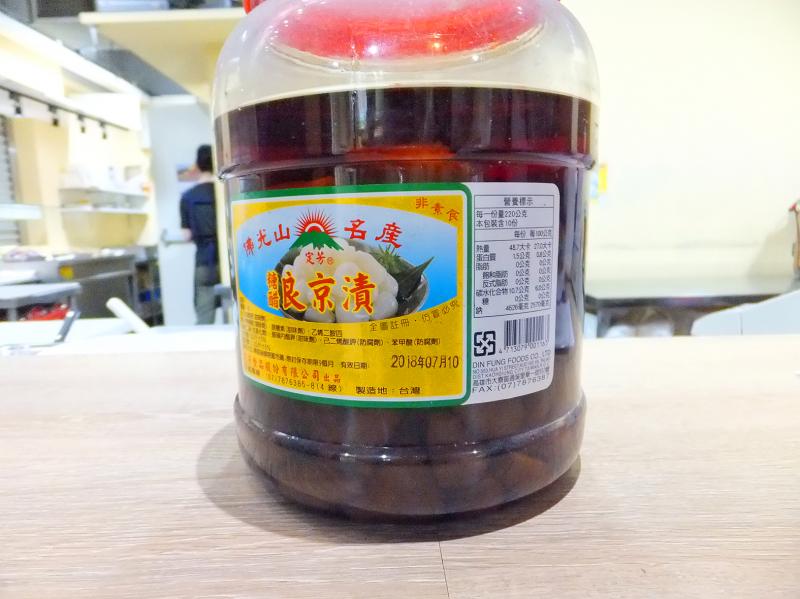An investigation of 29 university campus restaurants found 21 to be in contravention of food safety regulations, with breaches ranging from bacterial contamination to serving expired food, the Executive Yuan’s Consumer Protection Committee said.
The probe, which took place in April and last month, rated restaurants on campuses in Taipei, New Taipei City, Taoyuan, Hsinchu City, Taichung, Changhua City and Yilan City, on 24 points of compliance, committee official Wang Chih-hung (王志宏) told a news conference in Taipei on Wednesday.
Eight restaurants met all food safety requirements, while only one — Zhi-De Vegetarian at National Taiwan Normal University (NTNU) in Taipei — was also in full compliance with environmental and fire safety rules.

Photo courtesy of the Consumer Protection Committee
The most common food safety contravention — found at 10 of the eateries — was failure to arrange annual health checks for employees, which risks the spread of infectious lung or liver diseases, Wang said.
Another eight restaurants had unsanitary conditions, such as greasy floors or standing water, while six had improperly covered food products, four had cockroaches on site and three had frozen food stored at above minus-18°C, Wang added.
Of the two restaurants cited for using expired ingredients, the most serious contravention was at Ba-Yang Snacks at NTNU, where inspectors found six outdated products, including pickled vegetables that expired in 2018, committee member Wang Te-ming (王德明) said.
The Ministry of Health and Welfare is investigating the findings at the restaurant, but has yet to issue a fine.
The committee said that beverages at seven of 20 restaurants were found to have Enterobacteriaceae levels higher than the legal limit of 10 colony-forming units per milliliter.
Of those, Hsin Chi Yeh Barbeque Rice near Fu Jen Catholic University in New Taipei City and Ji Pin Hong Kong-style lunchbox store had contamination levels greater than 1,000 times the legal limit, the committee said.
Beloved Xiaolongbao, near Yuan Ze University in Taoyuan, had the most overall contraventions, including eight for food safety and seven related to its use of gas cylinders, it said.
All 22 restaurants checked for frying oil quality passed inspection, it said.
The inspections resulted in three restaurants being fined a combined NT$215,000 for safety issues related to improper use of liquefied gas cylinders and one for breaching recycling laws, it said.

The brilliant blue waters, thick foliage and bucolic atmosphere on this seemingly idyllic archipelago deep in the Pacific Ocean belie the key role it now plays in a titanic geopolitical struggle. Palau is again on the front line as China, and the US and its allies prepare their forces in an intensifying contest for control over the Asia-Pacific region. The democratic nation of just 17,000 people hosts US-controlled airstrips and soon-to-be-completed radar installations that the US military describes as “critical” to monitoring vast swathes of water and airspace. It is also a key piece of the second island chain, a string of

A magnitude 5.9 earthquake that struck about 33km off the coast of Hualien City was the "main shock" in a series of quakes in the area, with aftershocks expected over the next three days, the Central Weather Administration (CWA) said yesterday. Prior to the magnitude 5.9 quake shaking most of Taiwan at 6:53pm yesterday, six other earthquakes stronger than a magnitude of 4, starting with a magnitude 5.5 quake at 6:09pm, occurred in the area. CWA Seismological Center Director Wu Chien-fu (吳健富) confirmed that the quakes were all part of the same series and that the magnitude 5.5 temblor was

Taiwan will now have four additional national holidays after the Legislative Yuan passed an amendment today, which also made Labor Day a national holiday for all sectors. The Chinese Nationalist Party (KMT) and Taiwan People’s Party (TPP) used their majority in the Legislative Yuan to pass the amendment to the Act on Implementing Memorial Days and State Holidays (紀念日及節日實施辦法), which the parties jointly proposed, in its third and final reading today. The legislature passed the bill to amend the act, which is currently enforced administratively, raising it to the legal level. The new legislation recognizes Confucius’ birthday on Sept. 28, the

The Central Weather Administration has issued a heat alert for southeastern Taiwan, warning of temperatures as high as 36°C today, while alerting some coastal areas of strong winds later in the day. Kaohsiung’s Neimen District (內門) and Pingtung County’s Neipu Township (內埔) are under an orange heat alert, which warns of temperatures as high as 36°C for three consecutive days, the CWA said, citing southwest winds. The heat would also extend to Tainan’s Nansi (楠西) and Yujing (玉井) districts, as well as Pingtung’s Gaoshu (高樹), Yanpu (鹽埔) and Majia (瑪家) townships, it said, forecasting highs of up to 36°C in those areas